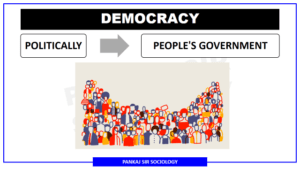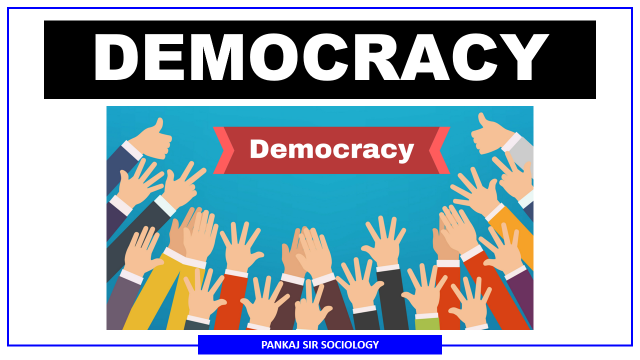- Democracy is a form of government where the people have a say in decision-making and policies.
- It aims for equality among citizens in determining laws and actions of the state. In reality, democracy is measured by how closely a system reflects this ideal, and a system is considered democratic if it allows for some level of citizen participation.
- The most prevalent form of democracy today is parliamentary democracy, where the public votes for representatives to make decisions in a legislative body.SALIENT POINTS

- Democracy is founded on the principle of sovereignty, allowing people to wield their power by electing representatives.
- Political equality is a cornerstone of democracy, ensuring that all citizens are treated equally under the law and have the same political rights regardless of their background.
- In a democratic system, governance is carried out by the party that secures the majority of votes, with the support of the majority being universally acknowledged.
- In Indian democracy, both state and central Councils of Ministers are collectively accountable to their respective legislatures, with no single minister bearing sole responsibility for government actions.
- Democratic governments must establish institutions that facilitate the formation of public opinion, with the legislature serving as a crucial platform for assessing and expressing public sentiment.
- While majority rule is a fundamental aspect of democracy, minority opinions are also valued and encouraged, promoting free discussion and critique of various proposals.
- Democracy upholds individual dignity by granting various rights such as freedom of speech, association, education, and cultural expression.
- Democracy relies on consent rather than coercion, resolving issues through dialogue, debate, and consensus-building among the majority.
- Many democratic nations adopt welfare policies, using democracy as a tool for comprehensive welfare provision while safeguarding individual freedoms and dignity.
- Independent judiciary is a hallmark of democracy, ensuring that the judiciary remains free from influence by the executive or legislative branches of government.
TYPES OF DEMOCRACY
- Federal and Unitary Democracy
In a federal democracy, power is divided between a central government and regional political units, such as states or provinces, with each having the authority to enforce its own laws on citizens. Changes to this arrangement require mutual consent from both levels of government.
In contrast, a unitary democracy places constitutional authority solely in the hands of a central government, which delegates certain powers to administrative divisions for day-to-day governance. Great Britain serves as an illustration of a country with a unitary government system.
- Direct and Representative Democracy
A direct democracy involves the people making decisions directly, while a representative democracy involves elected officials making decisions on behalf of the citizens. Direct democracy is typically only feasible in small communities, while representative democracy is the more common form of government in modern democratic countries, also known as a republic. - Constitutional and Non-constitutional Democracy
A constitutional democracy operates on the principle of popular sovereignty, with a constitution defining the government’s framework, powers, and constraints. In contrast, a non-constitutional democracy lacks adherence to constitutional regulations, allowing those in power to act without constraints. This type of government can be erratic and may infringe on individuals’ rights without consequence.
- Presidential and Parliamentary Democracy
In a presidential democracy, the executive branch is elected independently from the legislative branch. The president serves a fixed term and can only be removed through exceptional means, with powers balanced against those of the legislature. For instance, in the American system, the president can veto bills, but the legislature can override the veto with sufficient votes.
In a parliamentary democracy, political power resides in an elected legislature where the executive and legislative branches are not distinct. The parliament selects the prime minister, who can be removed through a vote of no confidence. This system often involves party members voting based on party affiliations due to the fusion of legislative and executive powers.
CONCLUSION
Democracy is a governmental system that derives its authority from the involvement of the populace. Although there are various forms of democratic governance, they all share common features such as competitive elections, equality in politics and law, and a strong emphasis on individual freedoms and civil liberties. In democracies, decisions are typically based on majority rule through elections, but a key challenge lies in finding a balance between respecting the will of the majority and protecting the rights of minorities. This balance varies across different democratic nations.
Task question – Democracy as an order of society. Elaborate. Explain the factors that prevent participation of people in politics
Answer writing pattern–
Structure: Introduction/Background, Define Democracy:
Working of democracy in society:
Brief explanation of the factors preventing participation of people in politics in any society:
Conclusion:


